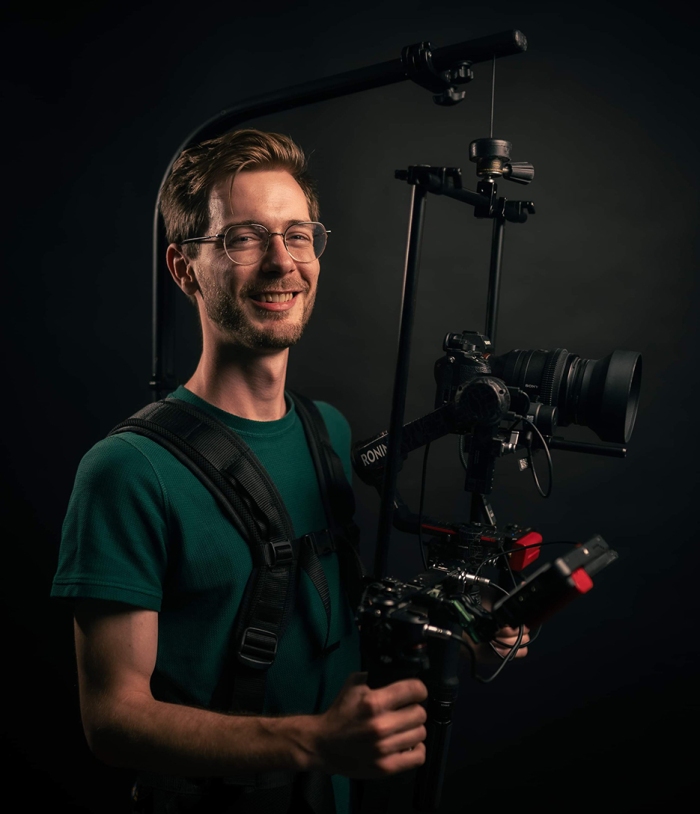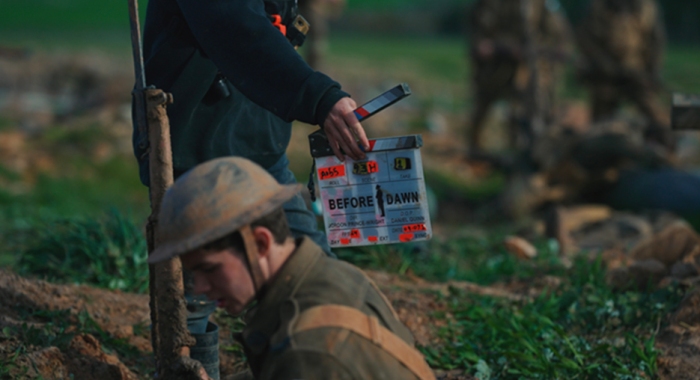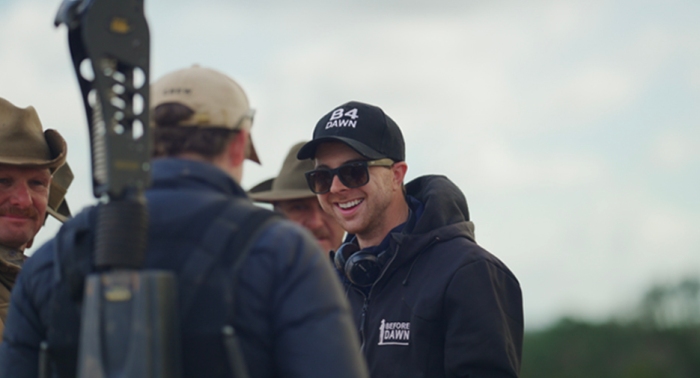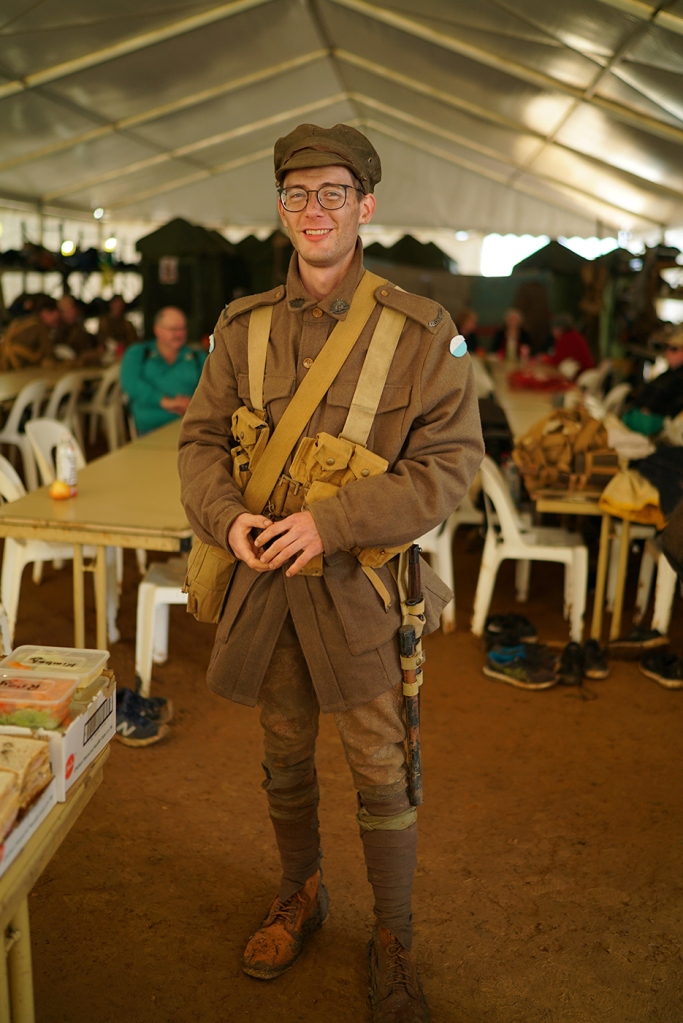
Benjamin Scotford. Photo by James Dudfield.
It’s not uncommon for movies to receive in-depth, standalone documentaries detailing intricate production processes, such as the acclaimed Hearts of Darkness: A Filmmaker’s Apocalypse about the making of Francis Ford Coppola’s Apocalypse Now, but it’s rare to see an Australian film afforded the same level of introspective exploration.
However, the new documentary In the Trenches breaks this mould by offering an immersive, and often jaw-dropping, behind-the-scenes look at the making of Jordon Prince-Wright’s Before Dawn, an ambitious, independently produced World War I epic made in Esperance, Western Australia.
In the Trenches, not only highlights the challenges and triumphs of bringing such a significant project to life but also underscores the excellence of Australian filmmaking on a global level.
Directed by Perth-based documentary filmmaker and videographer, Benjamin Scotford, In the Trenches is intended to be a standalone story, enjoyable for all filmgoers, including those unfamiliar with Before Dawn itself.
“I have aimed to capture Before Dawn’s story in a manner that closely reflects my first hand experience; Witnessing a group of dedicated filmmakers working against a mountain of obstacles before knowing the final outcome,” explains Scotford.
Cinema Australia recently caught up with Scotford to discuss In the Trenches ahead of the film’s world premiere at the Revelation Perth International Film Festival this July.

On the set of In the Trenches.
“I realised that once the storm has blown over and once everyone’s found a solution, then those moments become a great story that everyone wants to look back on as this obstacle that was overcome.”
Interview by Matthew Eeles
You run a company, Capture Behind the Scenes, with an aim to make more behind-the-scenes documentaries. How did you get started in this line of work?
I’ve been interested in filmmaking since I was a kid. I loved watching pieces about the making of Star Wars and movies like that. It was very interesting to me. I’ve been running my business for over ten years now, filming weddings and corporate videos, all that kind of stuff. As far as any behind-the-scenes work goes, there are a number of things that really pushed me into considering it. I’m a really big fan of The Walking Dead, which I run a podcast on. During COVID, I was able to reach out to a lot of the crew and directors because they were just sitting at home, so they were happy to come on and chat about the making of the show. Some of the amazing stories that came out of that hadn’t been included in the official behind-the-scenes content. That kind of ignited that spark in me to make behind-the-scenes content for local movies. It is something I’ve always wanted to do but figured in Perth it probably wasn’t really going to happen. Having the new studio announced recently was a big push for me.
You mentioned Star Wars. What films did you enjoy watching growing up?
Definitely Star Wars. The Lord of the Rings, which has an incredible making-of series, by the way. I loved Indiana Jones and all that kind of stuff. I loved learning about the practical effects used in those films. I love the trickery used by those craftsmen, and that just looked like it was something that was a really fun process to make. So yeah, that got me excited about the filmmaking process, and that’s now hopefully something that I can help bring to other people as well.
Has your interest in behind-the-scenes filmmaking stories changed the way you watch movies now? Does it take you out of a film’s narrative?
To an extent, yes. And I’m sure it’s very similar with you and what you do with Cinema Australia. There’s a part of your brain that you just have to try and shut off when you’re getting lost in the movie. And obviously, if a movie’s immersive enough, it’s going to happen naturally anyway. But to an extent, and definitely now, whenever I watch behind-the-scenes content, I’m thinking a lot more about how it was made and what questions must have been asked in the interview, all that kind of stuff.

Jordon Price-Wright on the set of Before Dawn.
How did In the Trenches come about?
I helped Jordon with a teaser trailer for his last movie, The Decadent and Depraved. It wasn’t a big job for me. I just kind of helped him put a few things together, and then we picked a font for the title at the end. [Laughs]. So I didn’t really do much, but that just kind of got me in the door with him where I was comfortable enough to flick him a message and say, “Hey, do you mind if I come along and film this?” So it really wasn’t much more than that.
Did your storytelling instincts lead you to this project, or were you just trying your luck?
More of the second one, to be honest. [Laughs]. Coming into this project, we definitely didn’t expect In the Trenches to be what it is now. All I was thinking was that I’ll get some cool shots for my showreel, and maybe we’d get ten or fifteen minutes’ worth of content to put on the DVD. But as we were there filming it, we realised that Jordon was making something special, so we just kept getting more and more and then realised in the edit that it could be something a lot more substantial. With any new projects I’m coming into now, I’m becoming a bit more aware of the potential from the beginning.
There were so many extras involved in Before Dawn, as well as an immense cast and crew. How careful do you have to be not to get in the way of the action?
That’s definitely one of the most important things. There’s my behind-the-scenes crew, and then there’s also the still photographers’ unit, and they both have that job of having to stay out of the way but also get as much content as they can because, as you can imagine, this is one of the few jobs on the film set where, if you weren’t there, the film would still get made. So you’re kind of the least important person on set, but you’ve also got to try and get usable footage to craft your own story. A lot of it is being aware of what is happening at all times. If their cameras are facing one way, I’m going to make sure I stay on the correct side of the line so I don’t get in the way. Also, if there was a particularly stressful day for the filmmakers, or if something wasn’t going quite right for someone, then just making sure to keep a bit of distance and not annoy anyone.
How accessible are the cast and crew on set?
Well, I would definitely say that this was a lot more unique and unconventional than probably most behind-the-scenes films. As you would know from watching the documentary, Before Dawn was made in a very out-of-the-box way. On the first day I was there, they had Channel 7 news on set doing interviews as well. So that made it kind of easy in the sense that we could take turns with each of the actors and we had around five minutes each, and those actors were ready for it. But outside of that, it was really just finding the right moments. If there was an actor who had already had their makeup done and they were just kind of waiting around for everyone else to be ready, then taking those moments to have a chat off to the side was ideal. You also have to be aware of everyone’s headspace. If they were preparing for an emotional scene and they didn’t want to be distracted, you have to give them their space. The trickiest actor to get access to was definitely Levi Miller because he’s in pretty much every scene, so there weren’t many moments where he was just sitting around. I tried a few times to ask him for an interview, and he was very understandably getting ready for a scene, so you really have to pick your moments.
Being a war film, there’s a lot going on in Before Dawn, from explosions to gun battles and everything in between. What was one of the most amazing things you witnessed on this set?
Good question. The explosions were certainly a lot of fun. Also, seeing the amount of extras all giving it their all, especially in the last week of filming. That was when they did the big battle scene and all the extras came down for that. I guess just being amongst that and seeing how many people there were charging up the hill or running and charging towards the trench. That was an unforgettable spectacle to see. And I guess one thing that really stood out for me was the natural beauty of Esperance. During the nurses’ hut scene, there was an incredible sunset that day. Because the movie’s supposed to be all gloomy and miserable-looking, they obviously couldn’t show a nice pink sunset for the sake of the scene in the movie. But being able to capture that in the doco and just experience that in real life was pretty cool.
Did you learn much about the filmmaking process you may not have known before?
Oh, for sure. I learned so much. Especially how Jordon works as a producer and as a director. I was able to listen in to some of the conversations he was having with actors. I liked seeing how relaxed he was, even while a lot was happening. A lot of the time, he would just give general direction to the actors for a scene and give the actors their character’s motivation, and then he’d see what the actors could achieve and tweak it after that if needed. So some of those things were quite interesting to learn from. I also learned a lot about the technical side of filmmaking from a lighting and cinematography perspective. I guess whenever you see someone else who’s really passionate about their creative approaches, it always leaves you with ideas for your own approaches. I also learned to keep the camera rolling at all times, even when something uncomfortable is happening in the moment. That’s also something I took away from watching Lost in La Mancha about the making of Terry Gilliam’s The Man Who Killed Don Quixote. Lots of things were going wrong, but the creators said that when you’re there and everyone’s stressed out, obviously you don’t want to be pointing a camera at someone who’s really freaking out and having a horrible time. But as soon as the moment passes, then everyone looks to you and says, “Did you get that on camera? That was so great.” So yeah, I learned that through trial and error here, learning how to keep recording but not be in people’s faces and annoying, and realising that once the storm has blown over and once everyone’s found a solution, then those moments become a great story that everyone wants to look back on as this obstacle that was overcome.

Benjamin Scotford on the set of Before Dawn.
The Before Dawn shoot relied on a lot of support from everyone on set, with many people performing multiple roles. Were you drawn into any extra work while you were on set?
[Laughs]. I was asked to be an extra. There’s a shot in the movie where they’ve got a long line of soldiers all walking in a row and the light horsemen behind them. Jordon wanted as many people as possible to be in that shot. So that was fun to be able to dress up for a few hours and get the full experience. But aside from that, I helped move a few chairs around once in a while, but not much. [Laughs]. I was able to really focus on doing my own thing, which was nice.
This is feeling very meta. Here’s a guy starring in a film he’s making a behind-the-scenes documentary about.
[Laughs]. I don’t know if I’ve made the final cut. I’m pretty sure the shot cuts off just before you see me because I was right at the back of the line.
Have you ever considered making narrative feature films rather than documentaries?
A little bit. I think it would be fun. Cinematography is probably the area I’d prefer to focus on if anything. Cinematography ticks all the boxes of everything I’m interested in, and it’s something that I’d like to do long-term. A lot of people within the industry see behind-the-scenes work as a great stepping stone into the industry because you get to be on set and learn a lot. But for me, if I do behind-the-scenes work for the rest of my life, I’d be very happy with that.
If you could go back in time to make a behind-the-scenes documentary on the film of your choice, which film would it be?
[Laughs]. That’s a fun question. It would be Jurassic Park. That’s my favourite movie. But I guess it would be any film that has a really interesting production sense. Maybe even something like Mad Max: Fury Road. There are a few documentaries out there, but you can tell there are a lot of moments that weren’t caught on camera. So to be there and to really cover it every day, something like that would be really interesting. Another one would be Pirates of the Caribbean. There’s quite a good doco for the second film, but that sort of thing where you’re traveling around to all these really unique locations. That would be quite fun.
In the Trenches will screen at Revelation Perth International Film Festival on Friday, 5 July. Details here. In the Trenches will be distributed by HALO Films in 2024.
If you enjoyed this article as much as I loved publishing it, please consider supporting Cinema Australia’s commitment to the Australian screen industry via a donation below.
I strive to shine a light on Australian movies, giving voice to emerging talent and established artists.
This important work is made possible through the support of Cinema Australia readers. Without corporate interests or paywalls, Cinema Australia is committed to remaining free to read, watch and listen to, always.
If you can, please consider making a contribution. It takes less than a minute, and your support will make a significant impact in sustaining Cinema Australia as the much-loved publication that it is.
Thank you.
Matthew Eeles
Founder and Editor.Make a donation here.


